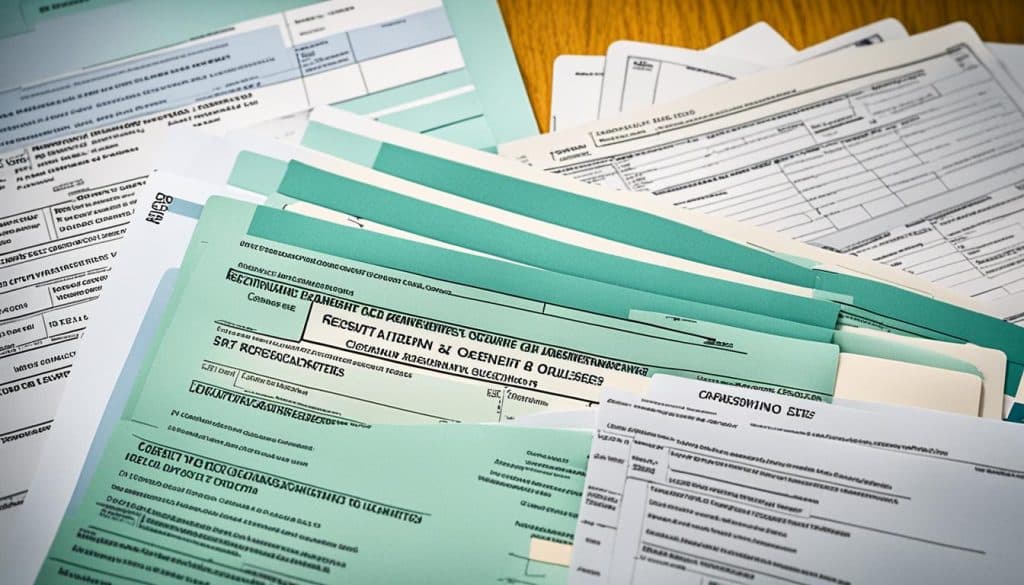Thinking of starting a small company in Ireland? Ireland is a great place for small businesses to grow. But, it’s important to know the steps and legal bits needed for a good start. This guide will walk you through the process and key things to think about when starting a small business here.
- Choosing the Right Business Structure
- Registering Your Business Name
- Obtaining Necessary Licenses and Permits
- Setting Up Your Business Bank Account
- Tax Registration and Compliance
- Hiring Employees and Employment Regulations
- Managing Finances and Bookkeeping
- Marketing and Promoting Your Small Business
- Securing Funding for Your Small Business
- Intellectual Property Protection
- Compliance with Data Protection Regulations
- Growing and Scaling Your Small Business
- FAQ
Key Takeaways:
- Setting up a small company in Ireland requires you to comply with legal and regulatory requirements.
- Registering your business name is an important step to establish your brand identity.
- Obtaining necessary licenses and permits is crucial to operate your business legally.
- Opening a dedicated business bank account helps separate personal and business finances.
- Tax registration and compliance are essential to meet your financial obligations.
Now that you know a bit about starting a small business in Ireland, let’s get into the details. We’ll guide you through each step to make the process smoother.
Choosing the Right Business Structure
Starting a small business in Ireland means picking the right business structure. This choice affects your company’s tax, liability, and ownership. The main structures are sole trader, partnership, and limited company.
Sole Trader
A sole trader is the simplest business type for small businesses. You own and control the business alone. But, you’re personally liable for all debts, risking your personal assets. This structure is simple, with less red tape and lower costs than other types.
Partnership
For businesses with more than one owner, a partnership might be best. Partners share profits and losses. Like sole traders, partners are liable for business debts. A clear partnership agreement is key to define roles and settle disputes.
Limited Company
A limited company is a legal entity separate from its owners. It limits liability, protecting personal assets if the business fails. Owners invest in shares and are only liable for that amount. These companies have more legal needs but gain credibility, funding access, and tax benefits.
Think carefully about each structure’s pros and cons before deciding. Consider your business goals, control level, risks, and tax effects.
Table Shows a Comparison of Business Structures in Ireland:
| Business Structure | Advantages | Disadvantages |
|---|---|---|
| Sole Trader | Simple to set up and operate Complete control over the business Lower financial requirements |
Unlimited personal liability Difficulties in obtaining financing Difficulty in transferring ownership |
| Partnership | Shared responsibilities and resources Lower financial requirements Ability to benefit from diverse skills and expertise |
Unlimited personal liability for all partners Potential conflicts and disagreements Difficulty in transferring ownership |
| Limited Company | Separate legal entity with limited liability Greater credibility Potential tax advantages Easier transfer of ownership |
More complex legal and administrative requirements Higher setup and ongoing costs Greater regulation and oversight |
Choosing the right business structure is a big decision. It’s best made with advice from legal and financial experts. The structure you pick affects your business’s success, growth, and management.
Registering Your Business Name
Registering your business name is key when starting a small company in Ireland. It helps set up your brand and follows the law. By doing this with the Companies Registration Office (CRO), you protect your brand and look credible in the market.
The Importance of Business Name Registration
Registering your business name means you get exclusive rights to use that name in your field. This stops others from using a similar name, avoiding confusion with customers. It helps you build a strong brand and trust with your audience.
It also gives your company a legal identity separate from yours. This protects your personal stuff from any business debts.
Legal Requirements for Business Name Registration
- First, pick a unique name that makes your company stand out. Make sure it’s not the same as any other registered name.
- Do a deep search to make sure your name doesn’t step on any trademarks.
- Fill out the CRO’s forms with the right info about your business.
- Pay the fee that comes with your application. The cost depends on your business type and other things.
- Include any documents the CRO asks for, like proof of address and ID.
- The CRO will check your application. If it’s good, they’ll approve your business name.
After registering your business name, make sure to show it off everywhere. Put it on your business signs, website, marketing stuff, and official papers. This makes your brand clear and follows the law.
| Benefits of Business Name Registration | Steps to Register Your Business Name |
|---|---|
| Establishes brand identity | Choose a unique name |
| Protects intellectual property | Check trademark availability |
| Builds credibility in the market | Complete the application |
| Avoids confusion among consumers | Pay the fee |
| Separates personal and business liabilities | Submit supporting documents |
| Review and approval |
Obtaining Necessary Licenses and Permits

Starting a small business in Ireland means knowing about the rules and getting the right licenses and permits. The licenses and permits you need depend on what your business does.
Business licenses let you legally run your business. They come from government bodies and show your business meets certain standards. You might need a general business license, a professional license, or an industry-specific one.
Permits are special permissions for certain activities or resources. For instance, opening a restaurant might need health and food handling permits. Starting a construction business could require building and environmental permits.
Identifying the Appropriate Licenses and Permits
Finding out what licenses and permits you need can be tough, especially if you’re new to this. It’s key to look into the rules for your industry and where you’re located. Use government websites, industry groups, and experts for help.
Think about talking to a lawyer or a business advisor who knows about rules. They can make sure you get all the licenses and permits you need. They’ll help you apply without any problems.
Applying for Licenses and Permits
After you know what licenses and permits you need, you can start applying. The process changes based on the license or permit and the agency giving it out.
You’ll usually fill out an application, provide documents, and pay fees. Some applications might need inspections, interviews, or checks, depending on your business.
Make sure you know what the application needs and when it’s due. If your application is not complete or late, it could be delayed or rejected.
Seeking Professional Assistance
Getting the right licenses and permits can be hard. If you’re not sure what you need or it’s all too much, get help. A business lawyer or a regulatory compliance expert can guide you through it.
Getting the right licenses and permits is key for your business to run well and avoid legal trouble. Knowing and meeting the rules helps build a strong base for your business in Ireland.
Setting Up Your Business Bank Account
Setting up a business bank account is key for managing your small company’s finances. We’ll guide you through the process. We’ll cover the different banking services and financial institutions in Ireland.
Choosing the right business bank account is crucial. Think about what your company needs. Look for a bank with services like low fees, easy online banking, and understanding of small business challenges.
Before opening your account, prepare your documents. You’ll need your company’s registration details, ID, and proof of address. Banks have different requirements, so check with yours ahead of time.
Key Factors to Consider When Choosing a Business Bank Account
When picking a business bank account, consider these factors:
- Fee Structure: Choose a bank with low fees for transactions and account upkeep.
- Online Banking: Go for a bank with easy-to-use online banking for managing your finances.
- Access to Credit: Look for banks that offer business loans, overdrafts, or credit lines for growth.
- Additional Services: Some banks offer services like payroll management, foreign exchange, or merchant services that can help your business.
Financial Institutions in Ireland
Ireland has many financial institutions for businesses. Some top banks include:
| Bank | Website |
|---|---|
| AIB (Allied Irish Banks) | https://personal.aib.ie/ |
| Bank of Ireland | https://www.bankofireland.com/ |
| Ulster Bank | https://digital.ulsterbank.ie/ |
| Permanent TSB | https://www.permanenttsb.ie/ |
Having a business bank account has many benefits. It simplifies bookkeeping, improves financial transparency, and makes tax easier. It also makes your business look credible to clients and customers by showing it’s a legal entity.
Do your research to find the best business bank account for you. With the right banking services and institutions, you can manage your finances better and grow your business.
Tax Registration and Compliance
Starting a small business in Ireland means you must understand your tax duties. It’s key to register your business with the Revenue Commissioners to avoid legal trouble.
You’ll need your business name, address, and contact info to start the tax registration. The Revenue Commissioners will then give you a Tax Registration Number (TRN). This number is vital for tax matters. All businesses in Ireland must register.
With your TRN, you must meet tax duties. This includes filing tax returns, paying taxes on time, and keeping financial records right. Not doing so can lead to fines or legal action.
Understanding Your Tax Obligations
It’s vital for business owners to know the taxes they might have to pay. Common taxes include:
- Income Tax: Based on your business profits and personal income
- Value Added Tax (VAT): Needed if your business makes over a certain amount
- Employer Payroll Taxes: If you have employees
- Capital Gains Tax: When you sell assets that have grown in value
Each tax has its own rules and deadlines. It’s crucial to keep up and meet your duties. The Revenue Commissioners offer guidance and resources to help you.
| Tax Obligation | Description |
|---|---|
| Income Tax | Calculated based on business profits and personal income. |
| Value Added Tax (VAT) | Applicable if business turnover exceeds a certain threshold. |
| Employer Payroll Taxes | Mandatory if you have employees. |
| Capital Gains Tax | Applied when selling assets that have increased in value. |
Meeting your tax duties helps fund public services like healthcare. It also keeps your business in good standing with customers and partners.
Getting advice from a qualified accountant or tax advisor is a good idea. They can help with tax planning, making sure you use all deductions and follow the law.
Understanding and meeting your tax duties is key for your business’s success in Ireland. Keep updated, seek advice when needed, and keep your financial records accurate to follow tax laws.
Hiring Employees and Employment Regulations

If you’re planning to hire staff for your small business in Ireland, knowing the employment laws is key. These laws help make hiring smooth and protect your business and workers. We’ll cover important parts of hiring, making contracts, and following the law.
The Recruitment Process
Getting the right people is vital for your business’s success. Use online job sites, professional networks, and social media to find candidates. Make sure you clearly state what the job involves to pick the best ones.
After picking candidates, do in-depth interviews and check their references. This helps you see if they’re right for the job. It’s a good idea to have several team members interview them to get a full view.
Employment Contracts
An employment contract sets out the rules of working for your company. It’s a legal agreement that protects everyone involved. When making a contract, include job details, duties, hours, pay, benefits, and how to end the contract. Always get legal advice to follow Irish employment laws.
Complying with Employment Regulations
As an employer, you must follow employment laws to ensure a fair and safe work place. Learn about the laws on pay, hours, holidays, sick leave, and employee rights. A detailed handbook on these laws can help you and your staff.
Also, make sure you follow health and safety rules to keep the workplace safe. Check your practices often to spot and fix any problems.
Following employment laws shows you care about your workers and want a positive workplace. This helps you keep good staff and builds a strong base for your business’s growth.
| Key Takeaways |
|---|
| 1. Understand employment regulations to ensure compliance and protect your business and employees. |
| 2. Plan and execute an effective recruitment process to attract and evaluate suitable candidates. |
| 3. Draft comprehensive employment contracts that cover essential details. |
| 4. Comply with minimum wage, working hour, leave, and employee rights regulations. |
| 5. Prioritize health and safety in the workplace. |
Managing Finances and Bookkeeping
Managing your small company’s finances and bookkeeping is key to success. A good financial strategy lets you track income and expenses. It helps you make smart business decisions and follow tax laws. We’ll guide you on managing finances, choosing the right accounting software, and keeping records right.
First, set up a separate business bank account to keep your personal and business money apart. This makes bookkeeping and financial reporting easier.
Then, pick a bookkeeping system that fits your business. Bookkeeping means recording financial activities, sorting them, and keeping accurate records. You’ll do things like send invoices, track expenses, reconcile bank statements, and manage payroll.
Some small businesses use spreadsheets or ledgers for bookkeeping. But, accounting software can make things easier and reduce mistakes. It helps track income and expenses, makes financial reports, helps with tax, and shows your company’s financial health.
When picking accounting software, think about your business size, specific needs, budget, and tech skills needed. Top choices for small businesses include QuickBooks, Xero, and Wave Financial. These offer features like automated invoicing, expense tracking, and bank reconciliation to help with financial management and bookkeeping.
Using good financial management and accounting software can make bookkeeping easier and give you insights into your business’s finances. Regularly check your financial records and make reports. This helps you make informed decisions, spot areas to improve, and plan for growth.
Marketing and Promoting Your Small Business
To make your small company stand out in Ireland, you need good marketing and promotion plans. With the right strategies, you can boost brand awareness, draw in customers, and increase sales. We’ll look at different marketing channels, digital marketing methods, and branding tips to help you get noticed and build a strong market presence.
Defining Your Marketing Objectives
First, set clear goals for your marketing. Decide what you want to achieve, like more website visitors, leads, or sales. Linking your marketing goals with your business aims will help you make focused campaigns.
Creating a Comprehensive Marketing Plan
A detailed marketing plan is key to guiding your efforts and keeping consistency. Start by finding out who your audience is and what they want. This helps you craft messages that hit the mark and pick the best ways to reach them.
Use a mix of online and offline marketing to reach more people. Digital marketing includes SEO, social media, email, and content marketing. Offline methods like print ads, direct mail, and events can also help promote your business locally.
Harnessing the Power of Digital Marketing
Digital marketing is crucial today. Use social media to connect with your audience, share useful content, and build loyalty. SEO can boost your website’s search engine ranking, bringing in more visitors.
Content marketing is another strong strategy. It means creating and sharing content that interests and engages your audience. Use blogs, videos, infographics, and other content that meets their needs and interests.
PPC ads let you show targeted ads on search engines and websites, bringing more traffic to your site and boosting sales. Email marketing helps you keep in touch with customers, build relationships, and encourage repeat business.
Building a Strong Brand Identity
Branding sets your business apart and connects with your audience. Create a unique brand identity with a logo, colors, and messaging that reflects your values and appeals to your audience.
Being consistent with your branding is vital. Make sure your brand looks the same across all your marketing, from your website to social media and ads. This makes your brand memorable and cohesive for customers.
Securing Funding for Your Small Business

Finding the right funding is key for small businesses to grow. We’ll look at grants, loans, and investors to help you get the financial support you need.
Grants
Grants are a great way to fund your business in Ireland. They come from the government, local authorities, and other groups. These funds support things like research, training, innovation, and growth. To get a grant, show how your project fits the grant’s goals and its benefits.
It’s important to research grants well and follow the application steps and deadlines.
Loans
Getting a business loan is another funding option. Irish banks and financial institutions offer loans for small businesses. A strong business plan is key to getting approved. It should outline your company’s goals, strategies, and financial forecasts.
Also, having a clear repayment plan and collateral can help. Look at different loans, their interest rates, and repayment terms to find the best fit for your business.
Attracting Investors
Investors can bring in money and valuable skills and resources. They might invest for a share of your company or through other deals. To attract investors, you need a strong pitch that shows what makes your business stand out and its growth potential.
Your financial forecasts and company value should be well-thought-out and realistic. Networking, going to industry events, and using online platforms like crowdfunding can help you meet potential investors.
In summary, you can fund your small business in Ireland through grants, loans, and investors. Look into grants, prepare a strong business plan for loans, and make a great pitch for investors. By exploring these options, you can get the financial support needed for your business to grow and succeed.
Intellectual Property Protection
Protecting your intellectual property is key to your small company’s long-term success. As you grow and innovate, understanding the importance of intellectual property rights, trademarks, and patents is crucial. These legal tools protect your unique ideas and give you control over them.
The Importance of Intellectual Property Rights
Intellectual property rights cover things like inventions, designs, logos, trademarks, and artistic works. They let you legally protect your ideas from being used without permission. This means you can stop others from copying or using your work without your say-so.
Registering your intellectual property gives you a strong legal base to defend your work. It helps keep your ideas safe and valuable. It also stops competitors from using your ideas without permission. This builds trust with investors, customers, and others who value ethical and legal business practices.
Trademarks and Patents: Safeguarding Your Innovations
Trademarks and patents are key for protecting your intellectual property.
A trademark is a sign, symbol, or logo that makes your products or services stand out. Registering it gives you the right to use, license, or franchise it. Trademarks are vital for building a strong brand, gaining trust with customers, and creating a unique identity.
A patent protects inventions and technical solutions. It lets you stop others from making, selling, or using your invention without your okay. Patents give inventors a temporary monopoly, letting them profit from their work and drive innovation.
Securing Your Intellectual Property Rights
Getting intellectual property protection means following certain steps, like registering your property type.
Trademark Registration:
- Do a full search to make sure your trademark is new and not taken.
- Apply to the right intellectual property office with all the needed details about your trademark.
- Get legal advice to help you with the trademark application.
Patent Registration:
- Check for existing patents to see if your invention is new.
- File a patent application with the right office, including a full description and claims about your invention.
- Use a patent attorney or agent to help with the patent process.
It’s important to work with legal experts in intellectual property law for guidance. They can help you protect your rights well. Remember, protecting your intellectual property is a smart move for your business’s future.
Understanding intellectual property rights, trademarks, and patents helps you protect your creations. It keeps your business ahead in the market. By safeguarding your intellectual property, you ensure your ideas stay unique, innovative, and valuable.
Compliance with Data Protection Regulations
Data protection is key for small businesses in Ireland, especially with the GDPR. As a business owner, knowing your duties is vital. It helps protect your customers’ and clients’ privacy.
The GDPR is a detailed law that controls how we handle personal data. It gives people more control over their info. Businesses must process data responsibly and securely. Not following the GDPR can lead to big fines and harm your reputation.
Create and Implement Privacy Policies
Creating privacy policies is a must under the GDPR. These policies explain how you collect, use, and protect personal data. They must be clear and tell people about their rights and how their data is used.
When making your policy, explain why you collect data, what kind of data it is, and how long you keep it. Tell people how they can see their data or stop marketing messages.
Securely Manage Customer Data
Keeping customer data safe is crucial. Use strong security steps to stop data breaches and protect personal info. This means using encryption, limiting who sees sensitive data, and keeping security up to date.
It’s also key to check your data handling regularly. Look at how you store, keep, and get rid of data. This keeps you in line with the law.
Stay Updated with Data Protection Laws
Data protection laws change, so keeping up is important. Always check for new rules and get advice if you need it. This helps you keep your data protection right and avoids fines.
| Key Actions to Ensure Compliance: |
|---|
| Create and implement clear privacy policies |
| Securely manage and protect customer data |
| Regularly review and update data management practices |
| Stay informed about changes in data protection laws |
Growing and Scaling Your Small Business
Once your small company is up and running, it’s key to focus on growth strategies. These strategies help you scale your company and grow your operations. Scaling means making deliberate moves to boost revenue, reach more customers, and improve how well your business does.
One good way to scale is to make your operations more efficient. This means making processes smoother, using technology wisely, and setting up systems that work well. Doing this can make you more productive and cut costs. This lets you put more money into growing your business.
Another important part of scaling is having a strong sales and marketing plan. Find out who your ideal customers are, build strong relationships with them, and use online platforms to reach more people. Also, focusing on keeping your customers happy can make them more valuable to your business.
Finally, forming partnerships with other businesses can really help you grow. Working with companies that complement yours or industry leaders can open up new markets. It gives you access to more resources and expertise, speeding up your growth.

















